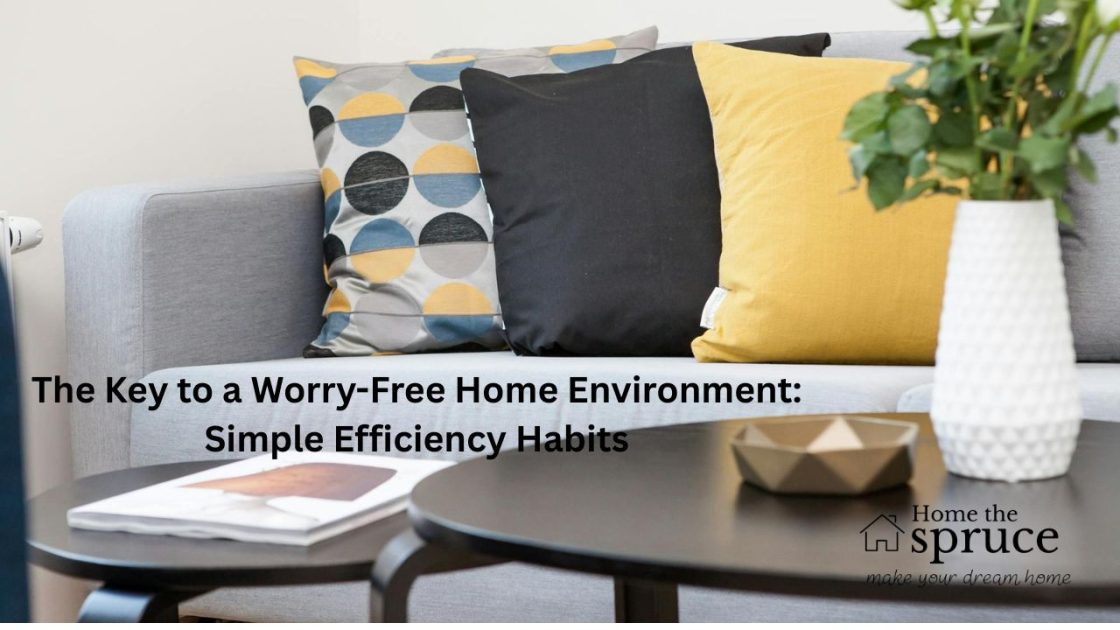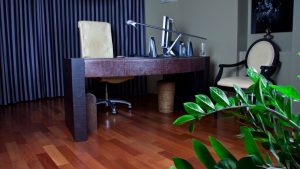Do you ever walk through your front door, drop your bag, and feel instantly overwhelmed? Maybe the lights are too dim, the dishes are still in the sink, and the air feels a little too stuffy. It’s your home—but it doesn’t always feel relaxing.

Many people are feeling this way lately. With remote work, family life, and constant headlines pulling our attention in every direction, the one place that should offer peace often feels like another to-do list. The modern home isn’t just a place to sleep. It’s now an office, a classroom, a café, and sometimes a gym. That’s a lot of pressure for one space.
But the problem usually isn’t the space itself. It’s how we manage it. A calm, well-functioning home doesn’t require a full remodel or a professional organizer. It starts with small habits. Daily choices. Tiny systems that help things run without chaos.
In this blog, we will share how simple efficiency habits can lead to a more peaceful, low-stress home—and why that matters more now than ever.
Start With the Systems You Depend On
Some things in your home you use every single day. Lights, heating, cooling, water. These are systems we take for granted until they stop working—and then suddenly, they’re all we can think about.
That’s why the first habit of an efficient home is simple: check the basics before they break. Regular upkeep helps avoid surprise expenses and last-minute stress. It’s not exciting. But it’s what keeps things running smoothly behind the scenes.
Take HVAC system maintenance as an example. It’s not something most people think about until the AC cuts out in July or the heat fails in December. But staying on top of filter changes, clean vents, and yearly checkups can extend the life of the system—and keep your home more comfortable all year round.
And comfort matters. Studies show that indoor air quality and temperature control are tied to better focus, sleep, and mental health. So when the HVAC is running well, it’s not just about avoiding repairs. It’s about feeling better in your space.
Declutter as a Daily Practice, Not a Project
Decluttering doesn’t have to mean emptying your closet and crying on the floor next to a pile of old sweaters. In fact, the most effective kind of decluttering happens in small doses.
Set aside five minutes at the end of each day to put things back where they belong. One basket of laundry. One drawer. One section of the counter. It doesn’t have to be perfect. It just has to be better than it was.
The point is to build rhythm. A rhythm where things slowly become easier to find, and the visual clutter slowly fades. This matters because visual clutter becomes mental clutter. When your eyes have less to scan, your brain has less to process.
In a time when we’re all overloaded with screens, notifications, and decisions, walking into a clean (and clear) room feels like a deep breath. It tells your brain: you’re safe, you’re home, and you don’t have to fight anything here.
Rethink How You Use Your Space
Homes were once designed with clear roles. A dining room was for meals. A living room was for guests. A kitchen was for cooking. But today, spaces have to do more.
One corner might double as a home office. Another might be a yoga spot, a craft zone, or a homework area. If that shift isn’t intentional, it turns into clutter fast.
Efficiency starts by naming the purpose of each space—even if it’s small. It can be as simple as “this chair is for reading” or “this table is for mail and keys only.” Once a space has a job, it’s easier to manage.
And if something doesn’t serve a purpose anymore, question why it’s still there. That fancy chair no one sits in? That gadget you haven’t used since 2021? If it’s not helping, it might be holding you back.
Light, Air, and Noise Matter More Than You Think
A calm space isn’t only about what’s visible. The air, the sounds, the lighting all matter.
Harsh lights create tension you don’t always notice. Stale air can make a room feel dull. Even background noise adds pressure to your brain. Keep lighting soft and natural where you can. Open your windows often, even just briefly.
Let the breeze refresh your space each day. Use fans or purifiers in crowded areas.
Fresh air clears your head more than expected. Add plants—they help clean the air naturally. Noise can affect mood without warning signs. Try white noise machines or soft ambient playlists.
Music can soothe, block distractions, and lift energy. Loud spaces drain people faster than you think. Even small changes can shift how rooms feel. Rearranging furniture makes everything seem more open. The more light and flow you create inside, the calmer and clearer your home will feel.
Build Routines That Work With You, Not Against You
Efficiency isn’t about doing more. It’s about doing things with less effort. That’s why good routines matter.
Mornings, for example, set the tone for the whole day. A five-minute tidy-up, a quick scan of the kitchen, and a list of what needs restocking can prevent little annoyances from piling up.
Evening routines help close out the day. Turning off lights, loading the dishwasher, resetting the living room. These simple cues tell your body it’s okay to slow down.
Don’t Try to Fix Everything at Once
One of the biggest traps in home improvement is trying to do too much too fast. You start with one cabinet, and suddenly you’re rearranging the whole kitchen.
But real efficiency isn’t about dramatic makeovers. It’s about progress you can live with.
Start with one room – or one habit. Do it consistently for a week. See how it feels. Then move on. This slow, steady approach builds trust in yourself. It shifts your mindset from “I have to fix everything” to “I know how to make this better.” That shift brings peace—and peace is the real goal.
In today’s world, where everything feels loud, fast, and unpredictable, having a calm home is more important than ever.
You don’t need perfection. You need function. You need flow. And you need a few habits that help life run just a little smoother.
Because when your home works with you—not against you—you show up better in every part of your life.
That’s the quiet power of efficiency. It doesn’t just keep the house in order. It keeps you in order, too.








